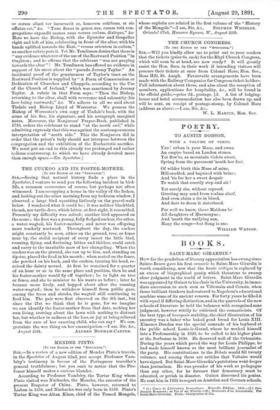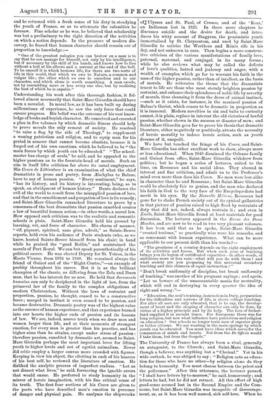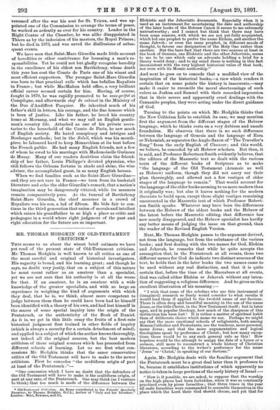BOOKS.
SAINT-MARC GIRARDIN.* How far the pendulum of literary appreciation has swung since Sainte-Beuve gave his first causerie to Saint-Marc Girardin is worth considering, now that the haute critique is replaced by an excess of biographical gossip which threatens to swamp clear judgment in the world of letters. Saint-Marc Girardin was appointed by Guizot to his chair in the University, in imme- diate succession to such men as Villemain and Cousin, when those brilliant thinkers had restored to Napoleon's educational machine some of its ancient renown. For forty years he filled it with equal if differing distinction, and in the quarrels of the new schools of literature he held the balances with recognised sane judgment, however wittily he criticised the romanticists. Of the best type of bourgeois stability, the chief illustration of his ancestry was a baker who baked good bread for Louis XIII. Ximenes Doudan was the special comrade of his boyhood at the public school Louis•le-Grand, where he worked himself into a Professorship in 1826, to be called to his higher place at the Sorbonne in 1830. He deserved well of the Orleanists. During the years which paved the way for Louis Philippe, he had made himself known as the most brilliant journalist of the party. His contributions to the Debats would fill twenty volumes, and among them are articles that Voltaire would have signed. But Saint-Marc Girardin's patriotism went deeper than journalism. He was prouder of his work as pedagogue than any other, for he foresaw that democracy must be educated, or perish in disaster. Guizot discerned his genius. He sent him in 1834 to report on Austrian and German schools,
• (1) &ars de Liftdrature Dramafique. Nouvelle Edition. 1530.—(2.) Teen Jacques Rousseau: ea Vie et us (Euvres.—(3.) Souvenirs d'un Journalists. Par Saint-Marc Girardin. Paris : Cnarpentier et Cie.
and he returned with a fresh sense of his duty in steadying the youth of France, so as to attenuate the calamities he foresaw. Fine scholar as he was, he believed that scholarship was but a preliminary to the right direction of the activities on which a nation depends. In the pressure of modern dis-
covery, he feared that human character should remain out of proportion to knowledge:— "One of the greatest eulogies you can bestow on a man is to say that he can manage for himself, not only by his intelligence, but if necessary by the skill of his hands, and knows how to live without a bell at his elbows and a servant at the end of the bell. To be oneself it is which bestows life, for there are two sorts of life in this world, that which we owe to Nature, a common and vulgar life ; the other which we owe to ourselves and to our character, and which alone is worth something. A man excels, not by resembling more or less every one else, but by realising the best of which he is capable."
Understanding his work after this thorough fashion, it fol- lowed almost necessarily that Saint-Marc Girardin should have been a moralist. In moral law, as it has been built up during millenniums of experience, he saw the only force that could ensure progress. His belief was the outcome of his vast know- ledge of books and boyish character. He conceived and executed a plan in five volumes by which dramatic fitness should help to prove morals the only cement of society. He resolved "to raise a flag by the side of Theology," to supplement a waning patriotism and religion, and to equip man for his
period in armour that cannot become obsolete, because it is forged out of his own emotions, which he believed to be " the main forces by which youth can be educated." " The school- master has charge of souls," he said, and he appealed to the higher passions as to the fountain-head of morals. Such an aim in itself lifts criticism far above its usual employment. His Cours de Litterature is an examination of what the chief
dramatists in prose and poetry, from IEschylus to Balzac, have to say of human passion. " Every sentiment," he says, "has its history, and its history is interesting, being, so to speak, an abridgment of human history." Dante declares the evil of the world to result from the misapplied passion of love, and that in the ennoblement and purgation of love is its remedy; and Saint-Marc Girardin ransacked literature to prove by a consensus of the best dramatists that passion ennobled creates a law of beautiful human action,—in other words, a moral law. How opposed such criticism was to the realistic and romantic schools is plain. Saint-Marc Girardin held his ground by learning, wit, and force of character. His charm of manner, " vif, piquant, spirituel, sans gene, adroit," as Sainte-Benve reports, held even his audience of Paris students (who, as we know, hooted Sainte-Beuve himself from his chair) in band while he praised the " good Rollin," and maintained the morals of Port Royal. We can but speak parenthetically of his political career. He was elected Deputy for St. Yrieux, in the Haute Vienne, from 1834 to 1848. He remained always the friend of Guizot and of the "Right Centre,"—an example of probity throughout his career. But it is as the brilliant champion of the classic, as differing from the Zola and Ibsen
man, that he has interest for us now. He held that documents humains can only be deciphered in the light of law, from the primaeval law of the family to the complex obligations of
modern Christendom. Without the laws of restraint and proportion, passion, he thought, ceased to be a constructive force ; merged in instinct it even ceased to be passion, and became destructive. Dramatic poetry was of the highest value as the essence of human experience, and that experience burned into our hearts the higher ends of passion and its lessons of law. We are, indeed, nearer truth when we draw men and women larger than life, and at their moments of strongest emotion, for every man is greater than his practice, and has higher aims than he attains, except under stress of passion : therefore passion, ennobled by dramatic art, seemed to Saint- Marc Girardin perhaps the most important lever for lifting youth to higher levels and out of egotist animalism. Never did critic employ a larger canvas more crowded with figures. Keeping in view his object, the eliciting in each of his hearers of his best self, he reviewed the literature of emotion. He disliked the analytic process of imperfect realism. " Let us
not dissect what lives," he said, foreseeing the ignoble errors that would ensue. He preferred to study humanity in the mirror of heroic imagination, with his fine critical sense of its truth. The first four sections of his Cours are given to
the poets who have described man's emotion in presence of danger and physical pain. He analyses the shipwrecks of; Ulysses and St. Paul, of Crusoe, and of the Kent,' an Indiaman lost in 1825. In three more chapters he discusses suicide and the desire for death, and intro- duces his witty account of Stagyros, the pessimistic youth immortalised by St. Chrysostom, and used by Saint-Marc Girardin to satirise the Werthers and Renes rife in his day, and not unknown in ours. Then begins a more construc- tive criticism of the various manifestations of family love, paternal, maternal, and conjugal, in its many forms ; while he also reviews what may be called the defects of love's qualities, hatred and jealousy and anger, with a wealth of examples, which go far to warrant his faith in the
uses of the higher passion, rather than of intellect, as the basis. of morals. He reiterates the theme that the dramatists truest to life are those who most sternly heighten passion by restraint, and enhance their splendours of noble life by severity of morals, thus cleansing it from the dross of animal instinct,. —such as it exists, for instance, in the maniacal passion of
Balzac's Goriot, which ceases to be dramatic in proportion as it is immoral. Modern novelties in sin and baits to curiosity cannot, it is plain, replace in interest the old victories of lawful passion, whether shown in the success or disaster of men ; and Saint-Marc Girardin goes far to prove his thesis that dramatic literature, either negatively or positively, attests the necessity of heroic morality to induce heroic action, such as youth dreams of it, unspoilt.
We have but touched the fringe of his Cours, and Saint- Marc Girardin has other excellent work to show, always more
or less educational. When 1848 dismissed the Orleans family and Guizot from office, Saint-Marc Girardin withdrew from politics ; but he began a series of lectures, suited to the time, on Rousseau and his social ideas. They abound in. interest and fine criticism, and admit us to the Professor's
mind even more than does his Cours. No men were less alike in character than he and Rousseau ; but Saint-Marc Girardin could be absolutely fair to genius, and the man who declared his faith in God to the very face of the Encyclopaedists bad merit in his eyes. By the Nouvelle Heloise, Rousseau had
gone far to shake French society ont of its cynical gallantries.
in that picture of passion raised to high flood by restraints of duty that did not, indeed, always restrain it ; and even in Smile, Saint-Marc Girardin found at least materials for good discussion. The lectures appeared in the Revue des Deux Honda, and arc now to be read in two very pleasant volumes. It has been said that as he spoke, Saint-Marc Girardin
"created truisms," so practically wise were his remarks, and so consonant with human experience. What can be more applicable to our present drift than his words ?—
" The greatness of a country depends on the right employment of its activities and forces. But when each year of teaching brings you its legion of certificated capacities—in other words, of ambitions more or less vain—what will you do with them ? and what society are you preparing by this universal secondary teaching and this chimzera of equal instruction ?"
"Don't break uniformity of discipline, but break uniformity
of teaching," was another of his pregnant sayings ; and again, "Let us beware of the unaccountable mania for neutrality,. which will end in destroying in every quarter the idea of right and wrong
" Education, the soul's training, instruction in Duty, preparation. for the difficulties and sorrows of life, is above college teaching. For after all men are only educated, that is to say, the develop- ment of heart and the shaping of character can only be done, by virtue of a higher principle and by its help. The love of father- land supplied it in ancient times. For Europeans there was for long religion, but now what influence have patriotism and religion on education ? Our schools no longer train men of superior piety or better citizens. We are wanting in the main-springs by which youth can be educated. You must have ideas which serve for the communion of minds and hearts. Not from the De Officiis would I take them, but from the Gospels."
The University of France has always been a rival, generally an antagonist, to the Church ; and Saint-Marc Girardin, though a believer, was anything but a " Clerical." Yet in his wide outlook, he was obliged to say : " Religion acts as educa- tion for those who have no other—by religion alone do they belong to humanity. You must choose between the priest and the policeman." After this utterance, the lecturer paused. " I shall have letters by to-morrow," he said, humorously ; and letters he had, but he did not retract. All this effort of high
good-sense seemed lost in the Second Empire and the Com- mune, but Saint-Marc Girardin was incapable of discourage- ment, or, as it has been well named, sick self-love. When he
resumed after the war his seat for St. Yrieux, and was ap- pointed one of the Commission to arrange the terms of peace, he worked as ardently as ever for his country. Leader in the Right Centre of the Chamber, he was alike disappointed in Thiers as by the indecision of his masters, the Royal Princes ; but he died in 1873, and was saved the disillusions of subse- quent events.
We have seen that Saint-Marc Girardin made little account of heredities or other contrivance for lessening a man's re- sponsibilities. Yet he could not but gladly recognise heredity in the excellence of his eldest son Barthelemy, whose death this year has cost the Comte de Paris one of his wisest and most efficient supporters. The younger Saint-Marc Girardin was born to that practical exile which has befallen Royalists in France ; but while MaeMahon held office, a very brilliant official career seemed certain for him. Having, of course, fought in 1870, be was rapidly promoted to be sous-prifet at Compiegne, and afterwards chef de cabinet in the Ministry of the Duc d'Andiffret Pasquier. He inherited much of his father's skill in letters, his courage, and the fine honour which is born of justice. Like his father, he loved his country home at Morsang, and what we may call an English gentle- man's country life. Attached as one of his private secre- taries to the household of the Comte de Paris, he saw much of English society. He hated conspiracy and intrigue and Boulanger methods ; but in the Soleil, which was his mouth- piece, he laboured hard to keep Monarchism at its best before the French public. He had many English friends, not a few of whom he owed to his marriage with Mademoiselle Gueneau de Mussy. Many of our readers doubtless claim the friend- ship of her father, Louis Philippe's devoted physician, who still follows the Orleans fortune in shade and shine, the wise adviser, the accomplished guest, in so many English houses.
When we find families such as the Saint-Marc Girardins- and they are not rare in France—we turn from its bookstall literature and echo the elder Girardin's remark, that a nation's imagination may be dangerously vitiated, while its manners remain comparatively pure. At the funeral of Barthelemy Saint-Marc Girardin, the chief mourner in a crowd of Royalists was his son, a lad of fifteen. He bide fair to con- tinue in the third generation that union of morals and intellect which raises his grandfather to so high a place as critic and pedagogue in a world where right judgment of the past and right education for the future are so important.




































 Previous page
Previous page